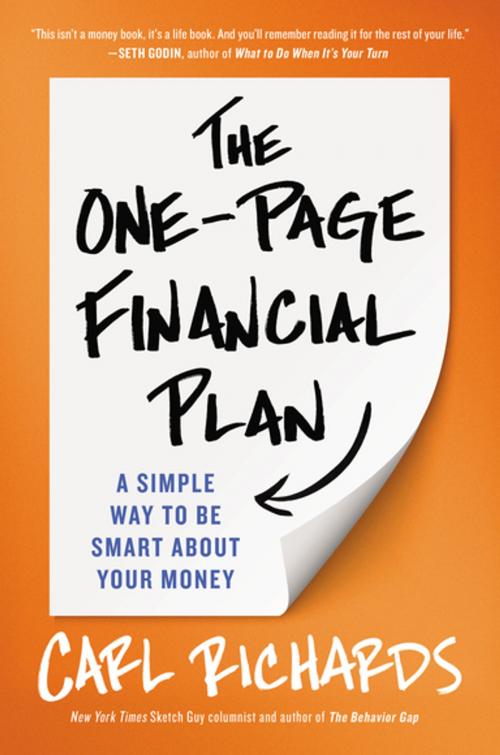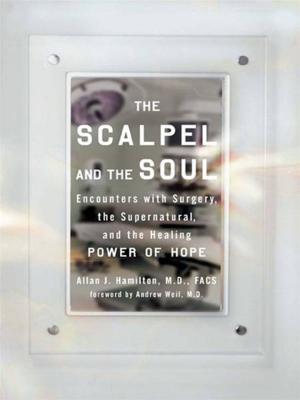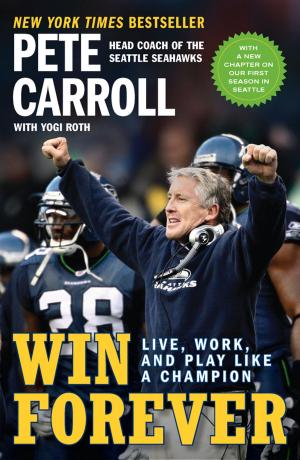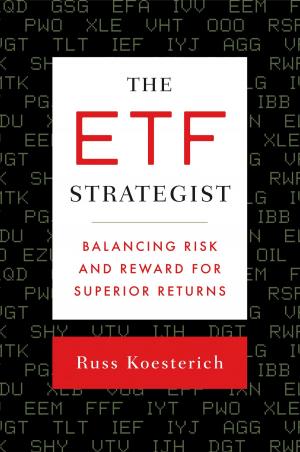The One-Page Financial Plan
A Simple Way to Be Smart About Your Money
Business & Finance, Personal Finance, Investing, Finance & Investing| Author: | Carl Richards | ISBN: | 9780698184565 |
| Publisher: | Penguin Publishing Group | Publication: | March 31, 2015 |
| Imprint: | Portfolio | Language: | English |
| Author: | Carl Richards |
| ISBN: | 9780698184565 |
| Publisher: | Penguin Publishing Group |
| Publication: | March 31, 2015 |
| Imprint: | Portfolio |
| Language: | English |
Whenever I tell people about my job as a financial advisor, the conversation inevitably turns to how hopeless they feel when it comes to dealing with money. More than once, they’ve begged, “Just tell me what to do.”
It’s no surprise that even my most successful friends feel confused or paralyzed. Even if they have a shelfful of personal finance books, they don’t have time to make sense of all the information available. They don’t just want good advice, they want the best advice—so rather than do the “wrong thing,” they do nothing. Their 401(k) and bank statements pile up, unexamined or maybe even unopened.
What they don’t realize is that bad calls about money aren’t failures; they’re just what happens when emotional creatures have to make decisions about the future with limited information. What I tell them is that we need to scrap striving for perfection and instead commit to a process of guessing and making adjustments when things go off track. Of course we’re going to make the best guesses we can—but we’re not going to obsess over getting them exactly right.
The fact is, in a single page you can prioritize what you really want in life and figure out how to get there. That’s because a great financial plan has nothing to do with what the markets are doing, what your real estate agent is pitching, or the hot stock your brother-in-law told you about. It has everything to do with what’s most important to you.
By now you may be wondering, “What about the details? How much do I need to invest each year, and how do I allocate it? How much life insurance do I need?” Don’t worry: I’ll cover those topics and many more, sharing strategies that will take the complexity out of them.
The most important thing is getting clarity about the big picture so you can cope with the unexpected. Maybe you’ll lose the job you thought was secure; you’ll take a financial risk that doesn’t pan out; you’ll have twins when you were only budgeting for one. In other words: Life will happen.
But no matter what happens, this book will help you bridge the gap between where you are now and where you want to go.
Whenever I tell people about my job as a financial advisor, the conversation inevitably turns to how hopeless they feel when it comes to dealing with money. More than once, they’ve begged, “Just tell me what to do.”
It’s no surprise that even my most successful friends feel confused or paralyzed. Even if they have a shelfful of personal finance books, they don’t have time to make sense of all the information available. They don’t just want good advice, they want the best advice—so rather than do the “wrong thing,” they do nothing. Their 401(k) and bank statements pile up, unexamined or maybe even unopened.
What they don’t realize is that bad calls about money aren’t failures; they’re just what happens when emotional creatures have to make decisions about the future with limited information. What I tell them is that we need to scrap striving for perfection and instead commit to a process of guessing and making adjustments when things go off track. Of course we’re going to make the best guesses we can—but we’re not going to obsess over getting them exactly right.
The fact is, in a single page you can prioritize what you really want in life and figure out how to get there. That’s because a great financial plan has nothing to do with what the markets are doing, what your real estate agent is pitching, or the hot stock your brother-in-law told you about. It has everything to do with what’s most important to you.
By now you may be wondering, “What about the details? How much do I need to invest each year, and how do I allocate it? How much life insurance do I need?” Don’t worry: I’ll cover those topics and many more, sharing strategies that will take the complexity out of them.
The most important thing is getting clarity about the big picture so you can cope with the unexpected. Maybe you’ll lose the job you thought was secure; you’ll take a financial risk that doesn’t pan out; you’ll have twins when you were only budgeting for one. In other words: Life will happen.
But no matter what happens, this book will help you bridge the gap between where you are now and where you want to go.















